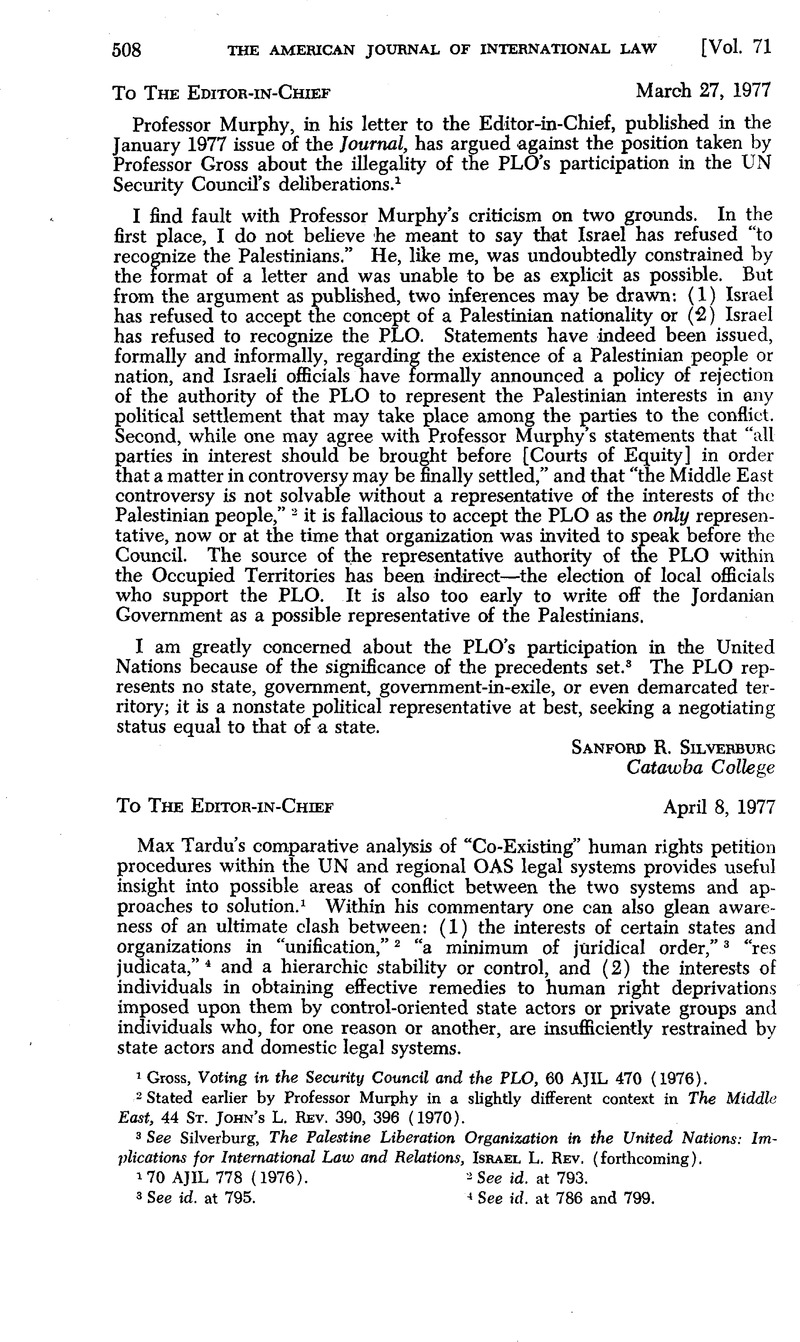No CrossRef data available.
Published online by Cambridge University Press: 23 March 2017

1 70 AJIL 778 (1976).
2 See id. at 793.
3 See id. at 795.
4 See id. at 786 and 799.
5 See id. at 795.
6 Ibid.
7 Such a recognition is commonplace; see, e.g. W. Korey, The Key to Human Rights —Implementation (CEIP pam. No. 570, 1968); J. Carey, Un Protection Of Civil And Political Rights (1970); and J. Paust, An International Structure for Implementation of the 1949 Geneva Conventions: Needs and Function Analysis, 1 Yale STUDIES IN WORLD PUB. ORDER 148 (1974).
8 Tardu, supra note 1, at 799.
9 Id. at 786. See also id. concerning double jeopardy.
10 See id. at 794 (the tortured political prisoner).
11 See, e.g. The Paquete Habana, 175 U.S. 677, 711 (1900), quoting Justice Strong, The Scotia, 81 U.S. (14 Wall.) 170, 187-88 (1871). See also 11 Ops. Atty. Gen. 297, 299-300 (1865).
12 Cf. Tardu, supra note 1, at 786.
13 See also UN Secretary-General Report, Respect for Human Rights in Armed Conflict, 24 GAOR, UN Doc. A/7720 (1969), stating that these are obligations owing to humankind rather than parties to a particular conflict; 4 Pictet, Commentary, Geneva Conventions Relative To The Protection Of Civilian Persons In Time Of War, 15-61, 587, 592, 593 (1958); Q. Wright, The Law of the Nuremberg Trial, 41 AJIL 38, 59 n. 74 (1947).
14 See 15 Trials Of The War Criminals 25 (1949).
15 G.A. Res. 2391 adopting the Convention on the Non-Applicability of Statutes of Limitation to War Crimes and Crimes Against Humanity, Art. 1, 23 GAOR, Supp. (No. 18) 40, UN Doc. A/7218 (1968) (vote: 58-7-36; against were United States, United Kingdom, South Africa, Portugal, Honduras, El Salvador, Australia). See also Hudson, International Tribunals 85 (1944), stating: “No statute of limitations exists in international law to bar the presentation of disputes or claims …“; G.A. Res. 2840, 26 GAOR, Supp. (No. 29) 88, UN Doc. A/8429 (1971); G.A. Res. 3074, 28 GAOR, Supp. (No. 30) 78, UN Doc. A/9030 (1973).
16 G.A. Res. 3074, supra note 15 (vote: 94-0-29).
17 Principles II and IV, Principles of the Nuremberg Charter and Judgment, [1950] 2 Y.H. Int. Law Comm. 374, UN Doc. A/1316 (1950); adopted by G.A. Res. 488, 5 GAOR, Supp. (No. 20) 77, UN Doc. A/1775 (1950).
18 Report Presented to the Preliminary Peace Conference by the Commission on the Responsibility of the Authors of the War and on Enforcement and Penalties 9 (1919). Members were: the United States, British Empire, France, Italy, Japan, Belgium, Greece, Poland, Romania, Serbia.
19 46 AJIL 161, 162 (1952) (French Cour de Cassation, 1950). See also 3 Manual Of Military Law, The Law of War on Land, 95, n. 2 (British War Office 1958), stating that no refuge is possible in a state which is bound by the Conventions and that a state cannot exonerate itself or others for violations.
20 See, e.g. U.S. Dep't. Of Army, Law Of Land Warfare, para. 506(b) (Field Manual 27-10, 1956); U.S. Dep't. Of Navy, Law Of Naval Warfare, para. 330(a) (Change 2) (1955). See also Respublica v. DeLongchamps, 1 U.S. (1 Dall.) III, 116 (1784); Henfield's Case, 11 F. Cas. 1099, 1107-1108 (No. 6, 360) (CCD Pa. 1793); 2 Grottos, De Jure Belli Ac Pack 253 (CEIP ed., Kelsey trans, 1925); E. De Vattel, L E Droit Des Gens, Ou Principles De La Loi Naturelle 163 (CEIP ed., Fenwick trans. 1916); and 4 PICTET, supra note 13, at 602 (“absolute” obligation).
21 G.A. Res. 3074, supra note 15.
22 See, e.g., Art. 131, Geneva Convention Relative to the Treatment of Prisoners of War, 12 Aug. 1949 (1956) 6 UST 3316, 75 UNTS 135 [hereinafter cited as GPW].
23 See, e.g., Commission Report, supra note 18, at 9, stating, “but no trial or sentence by a court of an enemy country shall bar trial and sentence by the tribunal or by a national court belonging to one of the Allied or Associated States.” See also Art. 86, GPW, which does not allow double punishment of a prisoner of war for the same act or offense. This does not necessarily preclude double jeopardy, and the provision is not one of the enumerated procedural guarantees for a “grave breach” prosecution. See, e.g., Art. 129, GPW.
24 See 1966 Covenant on Civil and Political Rights, Art. 14 (7), in 61 AJIL 861 (1967). No provision of a similar nature appears in the 1948 Universal Declaration of Human Rights, the 1950 European Convention on Human Rights, or the 1948 Convention on the Prevention and Punishment of the Crime of Genocide.
25 See Tardu, supra note 1, at 786.